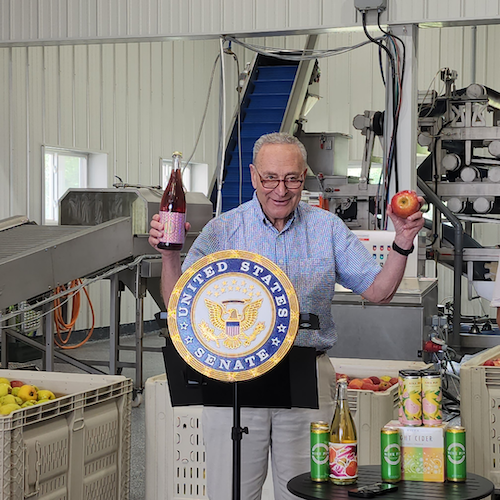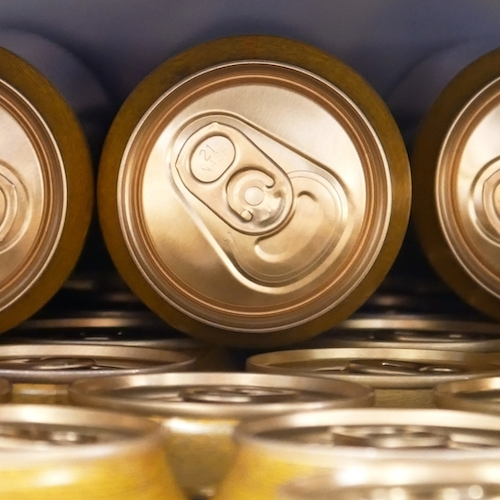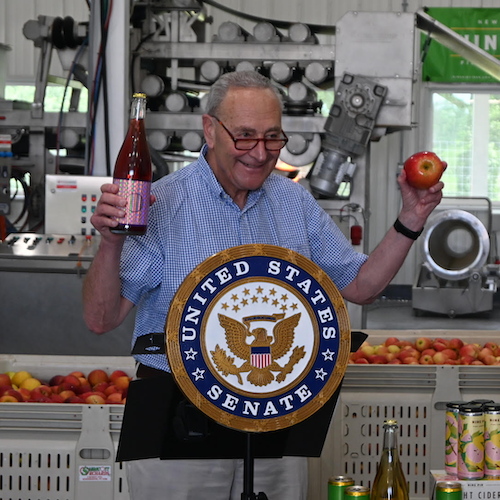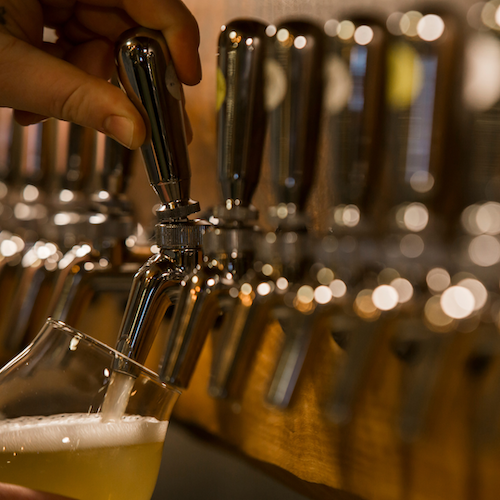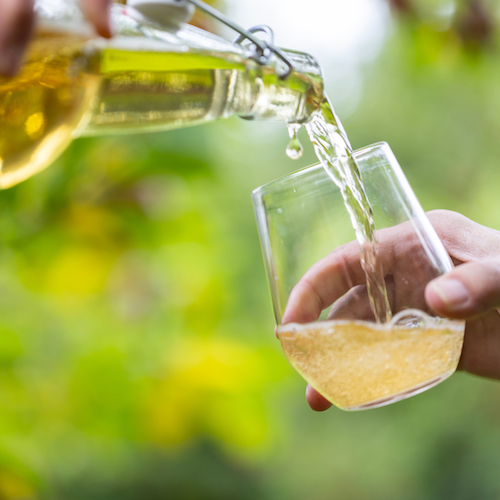Advocacy
Neo-Prohibition Gaining Momentum: State Laws Aim to Reshape Alcohol Policy
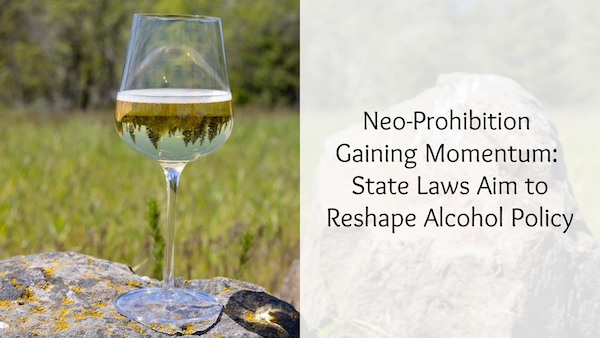
Across the country, a rising wave of neo-prohibitionist legislation is threatening the progress and vitality of the alcohol industry—including craft cider. Backed by well-funded advocacy groups, these efforts seek to restrict access to alcohol through steep increases in state excise taxes and burdensome packaging and labeling requirements.
While often framed as public health initiatives, many of these proposals rely on alarmist messaging, disproportionately punish small producers, and overlook data on responsible consumption, economic impact, and industry accountability. Some are more subtly introduced but carry significant consequences all the same.
In Washington, current proposed legislation (HB 2079) would substantially raise the total tax burden on cider. The proposed increase of $0.2128/gal would create a total new tax rate of $0.5208/gal, or a 69% increase, creating a compounding and disproportionate financial strain on cider producers.
In Oregon, legislation introduced earlier this year proposed both a hike in beer and wine excise taxes and an additional five-cent charge on every beverage container—effectively creating a non-refundable tax on small producers and consumers alike.
The American Cider Association has submitted formal letters of opposition to these proposals and joined coalition efforts with our bev-alc industry partners. We are actively monitoring similar efforts in Colorado, New Mexico, and Illinois, and remain committed to defending fair and balanced alcohol policy nationwide.
Our priorities are clear:
- Defend fair and equitable tax policy
- Promote responsible enjoyment and education
- Protect cider producers’ rights to grow and market their businesses
The ACA will continue to engage with lawmakers, mobilize grassroots advocacy when needed, and keep you informed every step of the way.
If you become aware of concerning legislation in your state or region, please don’t hesitate to contact us. Your insights and local perspective are vital to ensuring we’re able to act quickly and effectively.Together, we can push back against fear-based narratives and protect the future of American cider.
Bubble Tax Modernization Act Update – March 2025
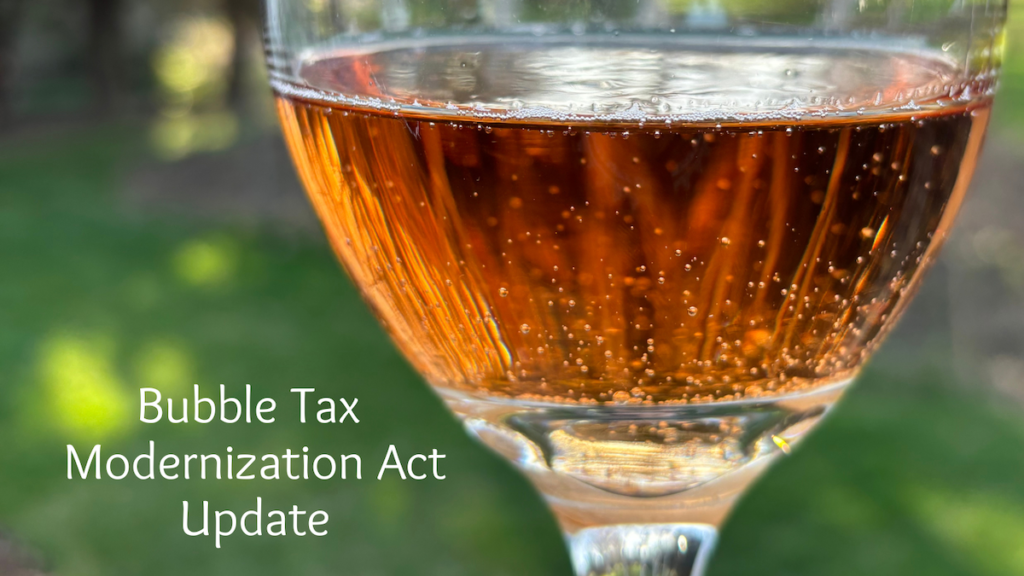
The American Cider Association (ACA) is now in its second year of advocacy efforts to pass the Bubble Tax Modernization Act. With a new Congress and a new Administration, we have a fresh opportunity to advance this critical legislation. New Congressional champions are in place, and momentum is building to move the bill forward this year.
What is the Bubble Tax Modernization Act?
Also known as the “Bubble Bill” or “Bubble Tax Bill,” this legislation does not change the excise tax structure for fruited ciders. Cider, perry, wine, and mead containing additional fruit ingredients will continue to be taxed at the existing $1.07 per gallon still wine rate.
However, the Bubble Bill seeks to modify the carbonation threshold that triggers the significantly higher $3.30+ per gallon “Bubble Tax.” Specifically, it proposes raising the allowable carbonation level from 0.39 CO₂/100ml to 0.64 CO₂/100ml, aligning taxation standards across different cider styles. This technical adjustment would provide producers with the flexibility to create a wider range of carbonated ciders without incurring excessive tax burdens.
Want to learn more Bubble Taxes? Download our 2-pager here.
ACA Advocacy Strategy
With new leadership in Congress, the ACA has adapted its advocacy approach to ensure the best chance of success. We have secured bipartisan support in the House of Representatives and are actively working to identify two Senate champions. Our Congressional partners are evaluating the best legislative pathway to advance this bill in 2025.
As we begin this new phase, we are in the “initial education stage”—working to inform key offices about the bill’s importance and build broad support. The coming months will be crucial in shaping the bill’s trajectory, and early feedback from Congressional offices has been encouraging.
Keep the Momentum Going
Engagement from industry stakeholders is vital at this stage. If you have a strong relationship with a Member of Congress or believe your Representative would be an ideal sponsor for the Bubble Bill, we encourage you to get involved. For guidance on outreach and messaging, please contact Jenn Root Martell at jenn@ciderassociation.org.
BREAKING! TTB Publishes Ruling Approving New Volumes for Cider, Wine & Mead
Rule Making is Giant Victory for ACA in Fight More Parity for Cider Category
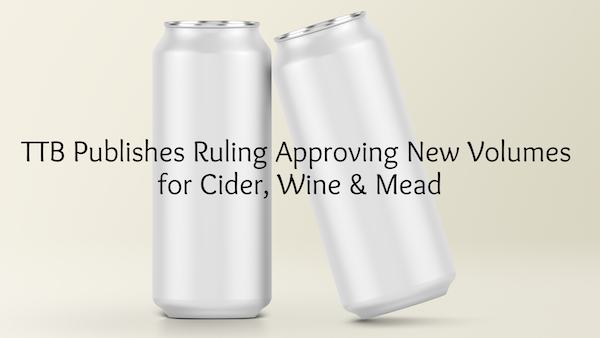
Portland, OR — The ACA is excited to share that the TTB announced today the addition of 13 new standards of fill for wine (including cider and mead), among them 473 ml (16 oz) and 569 ml (19.2 oz). The rule is set to be published in the Federal Register on January 10 and will be effective at that time. The American Cider Association is claiming the new standards as a major victory for the cider category and the Association, as pushing for more parity with beer and wine have been priorities in the Association’s strategic efforts to lift the cider category.
The newly approved standards now available to cider, wine & mead are:
- 473 ml (16 oz)
- 569 ml (19.2 oz)
- 180 ml
- 300 ml
- 330 ml
- 360 ml
- 550 ml
- 600 ml
- 620 ml
- 700 ml
- 720 ml
- 1.8 liter
- 2.25 liter
What This Means for Cider
The TTB regulates approved packaging volumes for wine, cider, mead and spirits. This authority was granted in the Federal Alcohol Administration (FAA) Act in 1935 at the time prohibition was repealed. As cider and mead are both subclasses of wine, the standards of fill for cider are contained in the TTB regulations covering labeling and advertising for wine (27 CFR part 4).
Previously, 16 oz and 19.2 oz can sizes were only an option for cider, wine, and mead under 7% ABV. Higher ABV cider (and wine and mead) could be labeled and distributed for in-state sales only if combined with a TTB-approved certificate of label (COLA) exemption. That was a challenging and limited solution for the cider industry.
“The COLA-exemption route was a band-aid. It proved that there is demand for higher ABV cider in these packaging volumes, but it wasn’t opening the market in a meaningful way. These new packaging volumes will be a game changer for regional cider in 2025,” said Jeff Parrish, Co-owner of Portland Cider Company and Committee Chair of ACA’s Government Affairs Committee.
An Opportunity for the US Cider Industry
Large format cans in convenience channels have been a critical source of growth for craft beverages since the COVID pandemic. Likewise, “imperial” ciders (cider over 6.9% ABV) have been a source of growth for cider in chain retailers, but imperial ciders in 16 oz and 19.2 oz cans were illegal.
“Now we will see single-serve regional cider succeeding in more convenience-oriented craft beverage spaces. That’s a big win for cider,” said ACA’s former longtime CEO Michelle McGrath who led the industry-wide efforts to lobby for the additional standards of fill until the end of December.
ACA board member Shannon Edgar of Stormalong Cider is excited about what the changes mean for a cidery like his. “We take a ‘hands off’ approach letting the cider ferment with less intervention. Some of these apples naturally ferment to ABV’s over 7% due to the higher sugar content. It’s great to be able to package these ciders in their natural state, in our container of choice that our customers are accustomed to,” Edgar said.
“Packaging is no panacea, but I’ve seen switching formats be a winning move for both larger regional cideries and smaller local cideries. Partnerships can help ease the cost of transition,” said McGrath.
A Track Record of Success for the ACA
The ACA first successfully lobbied for the addition of 355 ml (12 oz) cans for cider, wine, and mead in 2020. The change allowed regional cider to take advantage of ABV and packaging trends, and it made it easier for orchard-based cideries to incorporate cans, too. The adoption of 12 oz. packaging increased sales for the cider category. In 2024, regional cider was one of the only beverage alcohol categories to grow in both sales and volume. The ACA began pushing for 473 ml (16 oz) and 569 ml (19.2 oz) volumes to be added to approved wine standards of fill in 2022. Since the ACA’s original petition, they have continued to organize grassroots outreach and to lobby the TTB to adopt the changes. The TTB’s announcement today proves that the ACA and its members can collaborate to successfully pursue parity with other beverage categories.
###
To request an interview, please email ACA’s Board President, Christine Walter: christine@baumanscider.com.
The ACA is a 501(C)6 not-for-profit organization who is working to build and protect a sustainable and diverse cider industry in the United States through targeted education, advocacy, and a welcoming, thriving cider community.
Breaking News! ‘Bubble Bill’ Introduced to the Senate
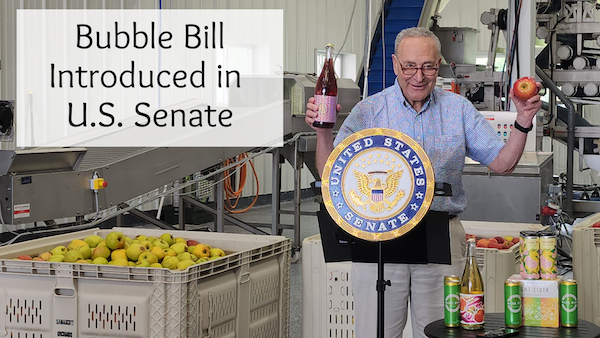
U.S. Senator Charles E. Schumer of New York introduced the Bubble Tax Modernization Act to the Senate (S.5442) on December 5, 2024. The American Cider Association applauds this as the next step toward carbonation parity which is critical for the future growth of the cider industry.
“There is no reason that craft cidermakers should get hit with a whopping 1,400% tax increase if they want to make bubblier cider or cider that is mixed with other fruits which has soared in popularity. It hurts our craft cidermakers, hurts consumers, hurts our growers, and is slowing the growth of this booming industry in Upstate NY,” said Senator Schumer. “That is why I am proud to support the Bubble Tax Modernization Act to finally pop this convoluted carbonation tax hamstringing the craft cider industry.”
In states like New York and others, where diversified farms are plentiful, putting a carbonation cap on fruit ciders limits opportunities for collaboration, innovation, and success with consumers for both growers and cidermakers. Products like Nine Pin Cider’s blueberry cider, made with a blend of apples from nearby Samascott Orchards and blueberries from Indian Ladder Farm, are a prime example of profit extension for local farms through year-round value-added agriculture.
Additionally, extreme weather events can create gaps in apple harvest, making co-fermentation or blending with other desirable fruits necessary in certain harvest years. “Flexibility in fruit is an important disaster mitigation option for growers,” says Michelle McGrath, CEO of the American Cider Association. “We’ve seen an uptick in co-ferments and fruit blends driven by consumer interest, but also driven by necessity. If your harvest was demolished by a freeze or a hurricane or a heat dome, why wouldn’t you consider blending with other fruit that had a better harvest? The bubble tax makes it harder to pivot when needed,” McGrath continued. “Frankly, bubble taxes are a needless snub at America’s fruit farmers. Don’t they have it hard enough?”
The American Cider Association is encouraging its members to reach out to their Representatives and Senators to ask them to sign on to the Bubble Tax Modernization Act. Our action tool has been updated to target both the House and the Senate, so you can send your message with the click of a button:
The ACA will continue working hard on this and other advocacy priorities to remove critical barriers that are preventing the cider industry from reaching its true potential. We can’t do this work without the support of our members like you. So please email your congresspeople and urge them to sign onto the Bubble Tax Modernization Act. Already emailed them earlier this year? Please email them again. We want their inboxes flooded with messages from cider industry folks around the country encouraging them to support the Bubble Tax Modernization Act.
TTB Reopening Comment Period on Proposed Standards of Fill
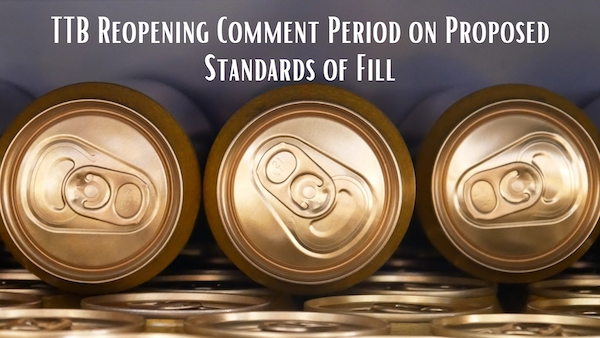
The TTB has opened a comment period on proposed additions to the standards of fill (Notice 210A) — including additions to the approved packaging sizes for wine, cider and mead over 6.9% ABV. The comment period will close on Oct 9, 2024 and the ACA is encouraging cideries and cider enthusiasts to submit comments in support of 16 oz (475 mL) and 19.2 oz (570 mL) packaging volumes for cider, mead and wine over 6.9% ABV. Comments can be submitted through the TTB’s website: SUBMIT COMMENTS HERE.
The ACA supports these additional standards of fill for cider because:
- Not having these common beverage alcohol packaging sizes cuts cider out of innovation opportunities driven by consumer demand.
- Lack of these packaging volumes puts cider at a disadvantage compared to beer and beyond-beer products taxed like beer, such as flavored-malt-beverages, who have access to these packaging volumes.
- Cider is an agricultural product made from apples. Apples will ferment to a higher ABV naturally depending on the weather that harvest season. Warmer temperatures equate to higher sugar levels resulting in higher alcohol levels. Making packaging decisions after fermentation is not a viable business model.
The American Cider Association is a staunch advocate for fair access to additional packaging sizes for cider, mead and wine over 6.9% ABV. In 2020, the TTB approved 355 ml (12 oz), 255 ml, and 200 ml packaging sizes in part as a response to ACA and ACA member petitions. In 2022, we petitioned for 16 oz (475 mL) and 19.2 oz cans (570 mL) for cider, mead and wine over 6.9% ABV and we have been advocating for their addition to permitted standards of fill ever since. In response to our inquiries, the TTB included 16 oz (475 mL) and 19.2 oz (570 mL) packaging volumes in their proposed rule. The summary of our comments can be found in Notice 210A.
Please join us in supporting the addition of 16 oz (475 mL) and 19.2 oz (570 mL) packaging volumes for cider, mead and wine. Be sure to submit your comments before October 9.
Help Shape the Future of Cider: Take the 2023 ACA Cider Production Survey
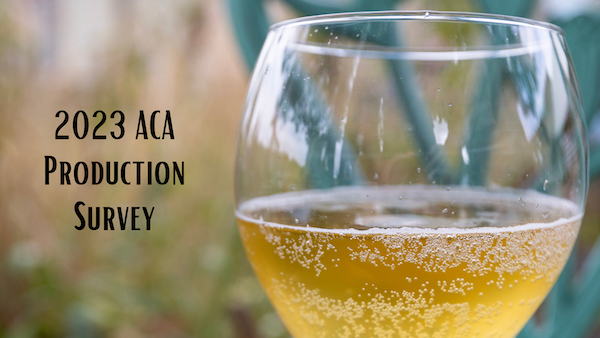
At the American Cider Association we work hard to support cider and cidermakers across the United States every day of the year, but we can’t do it without some help from you. We need to provide Congress, the media, and buyers with the most up-to-date and complete industry overview we possibly can. We are asking for you to assist us in collecting aggregated production information for the US cidery industry for 2023 so that we have the most accurate information to promote cider at all levels.
If you are licensed to make cider on a commercial basis we invite you to take our survey so we can gather information vital to promoting and protecting cider in the US.
Details:
- This survey will take about 30 minutes to complete.
- The survey is being aggregated and anonymized by a third party. They have agreed to not share information with us that might identify who you or your cidery are. YOUR PRIVACY MATTERS TO US.
- Your cidery name is collected by the 3rd party to ensure there are no duplicates, but the ACA will not store that information after the survey has been returned to us with identify features removed.
- We do ask a number of questions about sales, staffing and production for 2023. You will find it helpful to have that data handy before completing the survey.
- Note: If you produce wine or other beverages besides cider, please answer only considering your cider production.
- Deadline to complete the survey is December 13, 2024.
- Anyone who submits their completed survey and provides their contact info will be entered into a raffle to win an American Cider Association hoodie (4 available) and a grand prize winner will receive a complimentary ticket to CiderCon® 2025!
If you have any questions regarding this survey or how the data is used, please contact CEO of the American Cider Association Michelle McGrath.
We appreciate your help in allowing us to continue to promote cider across the United States!
New York’s Senator Schumer to Champion the Bubble Tax Modernization Act
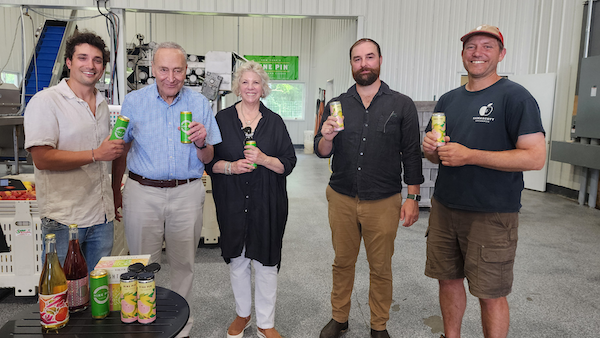
The American Cider Association is pleased to share that U.S. Senate Majority Leader Charles E. Schumer will be championing the Bubble Tax Modernization Act in the Senate. While standing at New York’s Samascott Orchards, a provider of apples to New York’s Nine Pin Cider, Senator Schumer emphasized his commitment to close the carbonation barrier that is continuing to hold back innovation in the cider industry.
“There is no reason that craft cidermakers like Albany’s Nine Pin should get hit with a whopping 1,400% tax increase if they want to make bubblier cider or cider that is mixed with other fruits which has soared in popularity. It hurts our craft cidermakers, hurts consumers, hurts our growers, and is slowing the growth of this booming industry in Upstate NY,” said Senator Schumer. “That is why I am proud to support the Bubble Tax Modernization Act to finally pop this convoluted carbonation tax hamstringing the craft cider industry.”
Senator Schumer has long been a supporter of the cider industry and was instrumental in the passage of the CIDER Act in 2016. The CIDER Act successfully lowered taxes and increased the allowable carbonation threshold on hard cider made from apples and pears. The Bubble Tax Modernization Act seeks to achieve a similar result for ciders fermented or flavored with fruits other than apples and pears.
In a state like New York where diversified farms are plentiful, putting a carbonation cap on fruit ciders limits opportunities for collaboration, innovation, and success with consumers for both growers and cidermakers. Products like Nine Pin’s blueberry cider, made with a blend of apples from Samascott Orchards and blueberries from Indian Ladder Farm, are a prime example of profit extension for farms through year-round value-added agriculture.
Additionally, extreme weather events can create gaps in apple harvest, making co-fermentation or blending with other desirable fruits necessary in certain harvest years. “Flexibility in fruit is important for growers,” says Michelle McGrath, CEO of the American Cider Association. “We’ve seen an uptick in co-ferments and fruit blends driven by consumer interest, but also driven by necessity. If your harvest was demolished by a freeze or a heat dome, why wouldn’t you consider blending with other fruit that had a better harvest? The bubble tax makes it harder to pivot when needed,” McGrath continued.
To put the current tax structure in content, 100 gallons of hard apple or pear cider costs $22 in federal taxes. However, if cidermakers make a co-fermented batch of cider with blackberries and carbonate it like other products, they will have to pay $340 in federal taxes. The Bubble Tax Modernization Act would allow fruit ciders to carbonate to the levels that hard apple and pear ciders are allowed. This change would allow cidermakers to give consumers the fruitier bubblier cider they want at a price they can afford.
The Bubble Tax Modernization and Tax Reform Act, which only applies to products under 8.5% alcohol by volume, would also open fruit mead and fruit wine up to more carbonation. Like cider, mead and winemakers with products under 8.5% ABV can carbonate at a higher threshold–until fruit is involved. In today’s beverage landscape, many producers are making cider, mead and wine. The lack of carbonation is a competitive disadvantage for these producers. The bill was introduced in January 2024 with bipartisan support on the house side through Congressman Earl Blumenauer (OR) and Congressman Mike Kelly (PA).
“We’re thrilled about Senator Schumer’s enthusiastic support of the Bubble Bill. He’s a champion for New York’s agricultural community and he gets that the community includes cider,” McGrath said.
To learn more about the current bubble tax, download our Bubble Tax Fact Sheet.
Government Affairs Update: ACA Lauds the CHEERS Act to Support Bars, Restaurants and Venues with Draft Systems
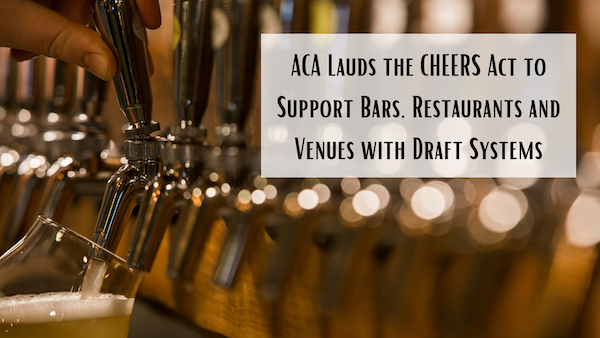
On March 11, U.S. Representatives Darin LaHood (R-IL-16) and Steven Horsford (D-NV-04) introduced the Creating Hospitality Economic Enhancement for Restaurants and Servers Act (CHEERS Act), a bipartisan effort aimed at supporting local businesses, restaurants, and bars with a focus on draft beverage systems. This legislation seeks to revitalize the hospitality industry by expanding tax incentives for investments in energy-efficient systems that include keg and tap property.
The American Cider Association has joined the Beer Institute, the Brewer’s Association, National Beer Wholesalers Association, the National Restaurant Association, the Independent Restaurant Coalition and others in applauding this effort. By offering support for the use of draft lines and keg equipment in establishments, the CHEERS Act recognizes the importance of draft beverages and their connection to a thriving hospitality sector.
Michelle McGrath, CEO of the American Cider Association, highlighted the significance of draft cider sales in the Beer Institute’s press release about the bill on March 11, stating that draft cider accounts for 60% of hard cider consumption at establishments.
“On-premise consumption plays a crucial role in introducing consumers to cider, making restaurants, pubs, taprooms, sports arenas, bars, and movie theaters vital components of the commercial cider ecosystem,” McGrath stated.
The CHEERS Act’s focus on supporting investments in new, energy-efficient draft equipment is welcomed by the cider industry as it provides much-needed relief for the hospitality sector. This legislation acknowledges the importance of draft sales in sustaining local small businesses and aims to contribute to their recovery during these challenging times.
The ACA applauds Representatives LaHood and Horsford for their introduction of the CHEERS Act.
To read more about the CHEERS Act visit the Beer Institute website.
Urge Congress to Support the Bubble Bill
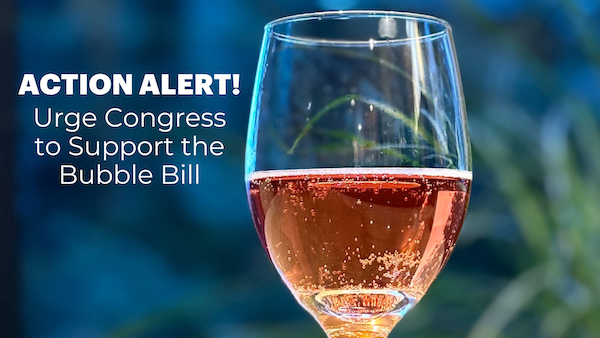
Earlier this year Representatives Earl Blumenauer (OR-D) & Mike Kelly (PA-R) introduced the Bubble Tax Modernization Act of 2024 (HR 7029) to the 118th Congress. Since then Representatives Suzanne Bonamici (OR-D), Andrea Salinas (OR-D), Lori Chavez-Deremer (OR-R), and Val Hoyle (OR-D) have signed on as co-sponors of the legislation. The “Bubble Bill” will amend a minor carbonation tax disparity for lower alcohol wine, cider and mead made with fruit. Read the complete bill here.
Despite the popularity of bubbly beverages, the carbonation tax–colloquially called the ‘bubble tax’ on fruit wine, fruit cider, and fruit mead makes carbonating these agricultural products at sparkling levels cost prohibitive. Most craft beverage entrepreneurs can’t afford to carbonate these products at the level the market wants. The result is that an important American agricultural sector is falling flat.
Current tax rates for low-ABV carbonated fruit wine, cider, and mead are $3.30 or $3.40 per gallon. Meanwhile low-ABV carbonated grape wines have a current tax rate of $1.07 per gallon. In addition, fruited beers, seltzers, hard kombucha, and ready-to-drink canned cocktails are carbonating freely to give consumers the bubbles they want.
Raising the floor of the carbonation tax threshold to include ALL low-ABV wine, cider, and mead to 0.64 grams of carbon dioxide per hundred milliliters will allow producers to compete more fairly in the evolving beverage market. The Craft Beverage Modernization and Tax Reform Act of 2020 achieved this for grape-only wines, but fruit-based craft beverages were overlooked. This created an excise tax disparity of $2.00 to $3.00 a gallon depending on the product. For more information download the Understanding Bubble Taxes explanatory document.
Allowing more carbonation will foster more economic opportunities for craft beverage makers, allow for more small producer collaborations, create increased opportunities for farms to stay viable with value-added products, and allow for diversification that could help farms and businesses mitigate disasters such as fires, droughts, floods, or crop disease.
Please ask your Congressional representatives to sign onto the Bubble Bill today to support American craft beverage producers and manufacturers.
Reps. Blumenauer & Kelly Introduce Bubble Bill
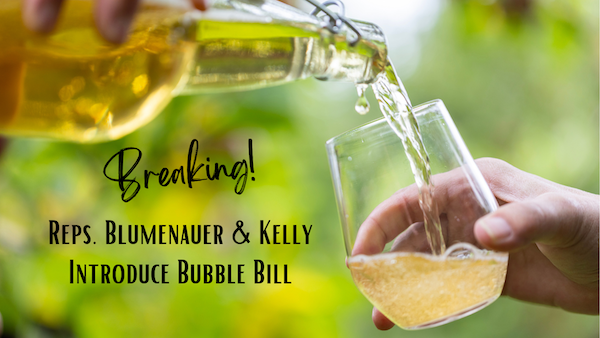
Representatives Blumenauer & Kelly Introduce the Bubble Tax Modernization Act
‘Bubble Bill’ Will Spur Innovation for Sparkling Co-fermented and Fruited Cider, Wine, and Mead
Washington, DC—Earlier today Representatives Earl Blumenauer (OR-D) & Mike Kelly (PA-R) introduced the Bubble Tax Modernization Act of 2024 (HR 7029) to the 118th Congress. The bill will amend a minor carbonation tax disparity for lower alcohol wine, cider and mead made with fruit.
Despite the popularity of bubbly beverages, the carbonation tax–colloquially called the ‘bubble tax’ on fruit wine, fruit cider, and fruit mead makes carbonating these agricultural products at sparkling levels cost prohibitive. Most craft beverage entrepreneurs can’t afford to carbonate these products at the level the market wants. The result is that an important American agricultural sector is falling flat.
“The cider industry is a quintessential American story. Pioneers taking what the land gives them and creating something magical. We must take every opportunity to support cidermakers, especially as the craft beverage industry recovers from the ravages of the pandemic. Right now, it is not a level playing field for cider, which is taxed more heavily than other carbonated, fruit-based beverages. My common-sense proposal will ensure cidermakers can create products for their customers, not the tax collector,” Rep. Blumenauer says.
Amie Fields, partner and sales manager at Botanist & Barrel Cidery & Winery in North Carolina, says the bill will enable innovation for their business.
“We are known for creativity and producing unique pet nats and bottle conditioned cider and wine with a range of ABVs, but recently we have been working on a series of lower alcohol content beverages. However, the carbonation tax currently disincentives our creativity, which hampers our ability to fully explore more sessionable beverages and boost our revenue by appealing to new customers,” explains Fields.
Current tax rates for low-ABV carbonated fruit wine, cider, and mead are $3.30 or $3.40 per gallon. Meanwhile low-ABV carbonated grape wines have a current tax rate of $1.07 per gallon. In addition, fruited beers, seltzers, hard kombucha, and ready-to-drink canned cocktails are carbonating freely to give consumers the bubbles they want.
Raising the floor of the carbonation tax threshold to include ALL low-ABV wine, cider, and mead to 0.64 grams of carbon dioxide per hundred milliliters will allow producers to compete more fairly in the evolving beverage market. The Craft Beverage Modernization and Tax Reform Act of 2020 achieved this for grape-only wines, but fruit-based craft beverages were overlooked. This created an excise tax disparity of $2.00 to $3.00 a gallon depending on the product.
Blumenauer’s legislation will address this disparity by changing how carbonation taxes are assessed. It will reduce a barrier for more innovative cider, fruit wine, and mead. In addition, it will create more economic opportunities for craft beverage makers, allow for small producer collaborations, create more opportunities for farms to stay viable with value-added products, and allow for diversification that could help farms and businesses mitigate disasters such as fires, droughts, floods, or disease.
HR 7029 is supported by the American Cider Association, the American Mead Makers Association, and Wine America.
###
The American Cider Association is an organization of cider and perry producers in the United States. Our mission is to grow a diverse and successful U.S. cider industry by providing valuable information, resources, and services to our members and by advocating on their behalf. You can learn more about them at www.ciderassociation.org.




